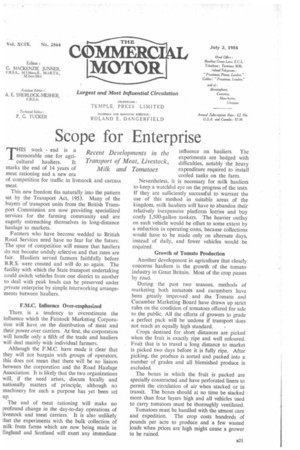Scope for Enterprise
Page 47

If you've noticed an error in this article please click here to report it so we can fix it.
THIS week end is a memorable one for agri cultural hauliers. It marks the end of 14 years of meat rationing and a new era of competition for traffic in livestock and carcass meat.
This new freedom fits naturally into the pattern set by the Transport Act, 1953. Many of the buyers of transport units from the British Transport Commission are now providing specialized services for the farming community and are eagerly entrenching themselves in long-distance haulage to markets.
Farmers who have become wedded to British Road Services need have no fear for the future. The spur of competition will ensure that hauliers do not become unduly selective and that rates are fair. Hauliers served fanners faithfully before B.R.S. were created and will do so again. The facility with which the State transport undertaking could switch vehicles from one district to another to deal with peak loads can be preserved under private enterprise by simple interworking arrangements between hauliers.
F.M.C. Influence Over-emphasized There is a tendency to overestimate the influence which the Fatstock Marketing Corporation will have on the distribution of meat and their power over carriers. At first, the corporation will handle only a fifth of the trade and hauliers will deal mainly with individual fanners.
Although the F.M.C. have made it clear that they will not bargain with groups of operators, this does not mean that there will be no liaison between the corporation and the Road Haulage Association. It is likely that the two organizations will, if the need arises, discuss locally and nationally matters of principle, although no machinery for such a purpose has yet been set up.
The end of meat rationing will make no profound change in the day-to-day operations of fivestock and meat carriers. It is also unlikely that the experiments with the bulk collection of Ilia from farms which are now being made in England and Scotland will exert any immediate influence on hauliers. The experiments are hedged with difficulties, notably the heavy expenditure required to install cooled tanks on the farm.
Nevertheless, it is necessary for milk hauliers to keep a watchful eye on the progress of the tests. If they are sufficiently successful to warrant the use of this method in suitable areas of the kingdom, milk hauliers will have to abandon their relatively inexpensive platform lorries and buy costly 1,500-gallon tankers. The heavier outlay on each vehicle would be offset to some extent by a reduction in operating costs, because collections would have to be made only on alternate days, instead of daily, and fewer vehicles would be required.
Growth of Tomato Production Another development in agriculture that closely concerns hauliers is the growth of the tomato industry in Great Britain. Most of the crop passes by road.
During the past two seasons, methods of marketing both tomatoes and cucumbers have been greatly improved and the Tomato and Cucumber Marketing Board have drawn up strict rules on the condition of tomatoes offered for sale to the public. All the efforts of growers to grade a perfect pack will be undone if transport does not reach an equally high standard.
Crops destined for short distances are picked when the fruit is exactly ripe and well coloured. Fruit that is to travel a long distance to market is picked two days before it is fully ripe. After picking, the produce is sorted and packed into a number of grades and all blemished produce is excluded.
The boxes in which the fruit is packed are specially constructed and have perforated liners to permit the circulation of air when stacked or in transit. The boxes should at no time be stacked more than four layers high and all vehicles used to carry tomatoes must be thoroughly ventilated.
Tomatoes must be handled with the utmost care and expedition. The crop costs hundreds of pounds per acre to produce and a few wasted loads when prices are high might cause a grower to be ruined.








































































































































